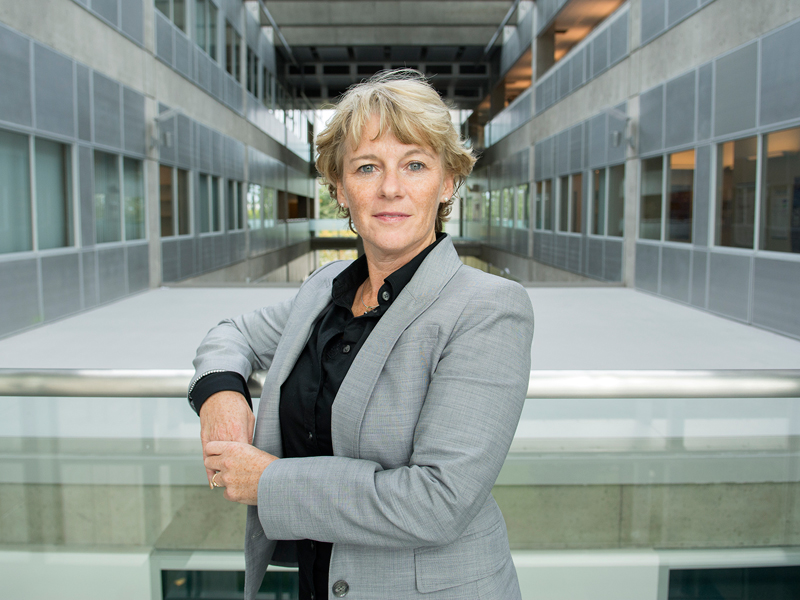Five new research chairs share passion for improving lives
Science, Peter B. Gustavson School of Business, Human and Social Development, Humanities, Engineering
- Valerie Shore

Finding better ways to detect and treat cancer, understanding how to navigate global economies, expanding our knowledge of modern South Asia, helping us make sense of complex datasets, and improving the success of addiction treatment—these are the goals of the University of Victoria’s five newest Canada Research Chairs.
The five chairs were announced on Feb. 9 by Kirsty Duncan, Minister of Science, as part of a national announcement of new chairholders across the country.
Now in its 16th year, the Canada Research Chairs program helps Canadian universities attract and retain the best scholars in the world and build on existing areas of research strength. The chairs also give students the opportunity to work side by side with researchers who are world leaders or emerging world leaders in their field.
New ways to fight cancer
Cancer is responsible for 30 per cent of all deaths in Canada and medical physicist Magdalena Bazalova-Carter is determined to reduce that toll. As the Canada Research Chair in Medical Physics, she’s looking at ways to improve how we diagnose and treat cancer using innovative x-ray technologies—and miniscule particles of gold injected into the bloodstream.
Bazalova-Carter plans to design and build a high-resolution desktop imaging system that chemists, biologists and immunologists worldwide can use to develop and test new imaging techniques. “We know that cell death is enhanced when gold nanoparticles are irradiated with low-energy x-ray beams,” she explains. “We hope to design a new cost-effective, low-energy radiotherapy source for improved patient outcomes.”
Restoring the forgotten voices of history
Our telling of world history and politics has mostly been thin on marginalized voices. As the Canada Research Chair in Global and Comparative History Studies, historian Neilesh Bose is expanding our knowledge of decolonization, diasporas and migration, particularly in the context of his main area of research—South Asia.
Bose is exploring the oral histories of Bengali intellectuals at the end of the era of the British Empire who voiced critiques of Marxism as well as the modern state. “I want my work to enable students around the world to have the kinds of discussions that will expand our understanding of modern South Asia and its role in globalization,” he says.
Exploring global economies
The “emerging economies” of many low and medium-income countries in Asia, Africa, and Central and South America are expected to dominate world markets over the next 20 years. As the Canada Research Chair in Global Economy, business professor Ravee Chittoor is examining how multinational firms from developed countries such as Canada can operate and succeed in these economies.
“Emerging economies are attractive opportunities for domestic and foreign corporations, but they are also challenging to navigate due to their unique political, economic and social environments,” says Chittoor. “My interest is to understand how institutional environments influence firm success and performance in these emerging economies.”
Our new world of "big data"
The rapid growth of computing and social technologies is generating an overwhelming amount of data. As the Canada Research Chair in Human and Social Aspects of Software Engineering, Margaret-Anne Storey studies how technology can help people explore, understand, visualize and share big data sources and complex information.
Storey is currently looking at how social media can advance a more participatory culture in the software development community. “My goal is to improve software tools that encourage knowledge workers to think and work together, making it easier for people to learn, share knowledge and connect with others,” she says. Other applications areas have included biomedicine, security and education.
New horizons in addictions and recovery
Why do some people forced into alcohol and drug treatment falter, while others succeed? What programs and services are needed to increase success? These are questions epidemiologist and health services researcher Karen Urbanoski intends to answer as the Canada Research Chair in Substance Use, Addictions and Health Services Research.
“No one has studied whether or how initially resistant people come around to accepting treatment,” says Urbanoski. “Findings will help us move beyond the rhetoric surrounding this controversial and ethically challenging issue and develop effective ways of reducing the burden of addiction.”
Today’s announcement also includes the renewal of computer scientist George Tzanetakis as the Canada Research Chair in Computer Analysis of Audio and Music. Tzanetakis develops computer-based tools for manipulating large audio collections for more effective interactions between computers, musicians and listeners.
UVic currently has 30 filled Canada Research Chairs.

